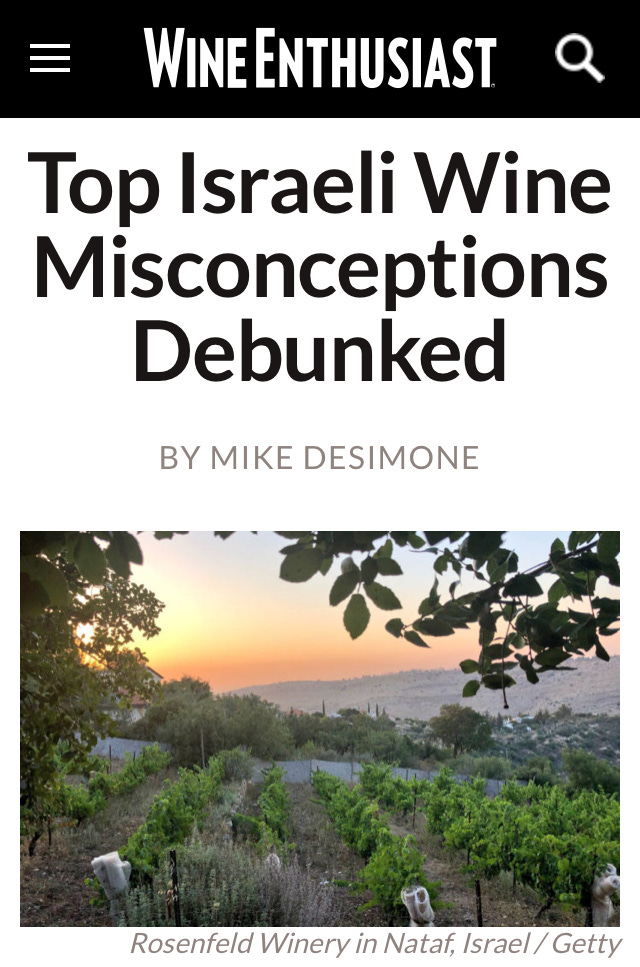More Than Just Manischewitz
The Historic Birthplace of Wine. When it comes to the OG of Old World wine, there is none older than the Middle East. And while Israel may be one of the earliest wine producing countries, it tends to be viewed as a more New-ish World wine region. Grapes have been grown in the area for 8,000 years, but the Israeli wine industry is relatively young. It was revived in the late 19th century by Baron Edmond de Rothschild, owner of Château Lafite Rothschild in Bordeaux, who is heralded as the father of modern winemaking in Israel. He helped establish what would become Carmel Winery, the country’s oldest continous winery, and there are now about 300 wineries, with the largest producers (Barkan, Carmel, and the Golan Heights wineries) controlling over 83% of the local market. Most (but not all) of the wine is kosher, and as animal-based additives are not permitted, it is also vegan. It is primarily consumed domesically, but about 20% is exported annually. While the overly sweet Manischewitz Wine (aka the liquefied grape jelly made in NY) has often been the poster child for kosher wine, a quiet revolution has been taking place in the cellars and vineyards of Israel. Like in other countries, a new generation of winemakers are reshaping the wine industry, and are slowly moving away from the big, powerful wines that have dominated much of the industry. Having just visited Israel, I got to taste some very good, natural-ish wines.

Yaacov Oryah is a winemaker that challenges conventions, has an uncontrollable urge to be experimental and is very focused on making honest wines. While he works for a larger commercial winery, Psagot, he also has a private winery under his name where he makes wine in tiny quantities. His curiosity and urge to be experimental led him to produce Israel’s first orange wine in 2007. He had become fascinated by the skins of the grapes as he could not understand why, if all the flavor of red wines came from the skins, winemakers dispensed with the skins of white grapes. I tried a few of his wines at Brut in Tel Aviv, and my favourite was the Jemma Semillon orange wine made for the restaurant. Oryah believes that the Israeli wine industry is moving towards lighter-bodied wines because consumers’ palates are maturing and getting tired of heavy wine: “As a winemaker my goal is not to make a wine where people say ‘wow,’ but to make a wine where they want to have a second glass.”

Recanati Winery is the first winery to restore the indigenous variety Marawi. During the Mameluke and later the Ottoman periods, the local authorities forbade the preparation of wine, so local grape varieties gradually became extinct. Recanati restored the ancient variety, producing only 2,480 bottles from the first 2014 harvest. I bought the 2017 vintage and am looking forward to enjoying this ancient and candid expression of the Israeli terroir just like King David probably did. Though for him it was considered a young wine and he probably didn’t use the word ‘terroir’.

Maybe There Is Kosher Natural-ish Wine After All? The day I arrived in Israel I read an article asking why there is no kosher natural wine, written by natural wine advocate Alice Feiring. I have been wondering the same thing, and while the wine I tasted in Israel may not be officially considered natural, many of these small producers are making wine by hand and practicing a winemaking philosophy that I would consider natural-ish. Other wines I would have liked to have tried include Clos de Gat, Gros Winery, Margalit Winery (who symbolize the boutique wine revolution that swept Israel in the 90s), Garage de Papa, Jezreel Valley Winery (who work mostly with Mediterranean varietals because making ‘French wine’ in Israel is kind of weird), Shoresh wine from Tzora Vineyard, Avidan Winery, and Bar-Maor Winery who practices a total laissez-faire way of winemaking with minimum intervention making wine as naturally as possible. I am sure I have barely made a dent in learning about Israeli wine, but all the more reason to go back. Maybe next time with Alice Feiring.



